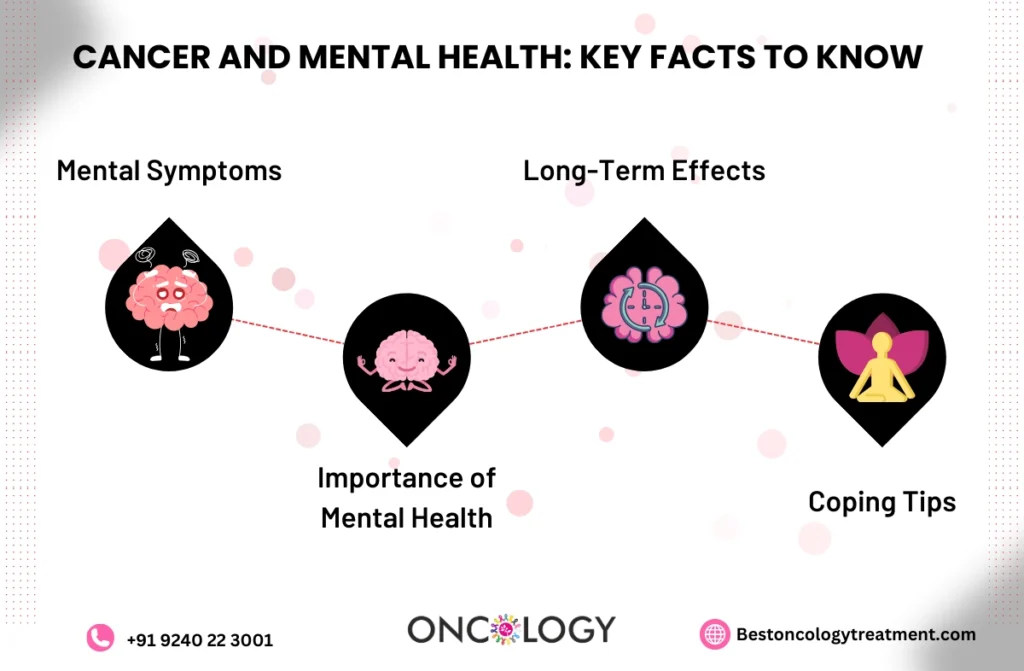Cancer and mental health are closely linked, with each having a significant impact on the other. The emotional toll that cancer takes on a patient can be as challenging as the physical aspects of the disease. It is essential to acknowledge the connection between cancer and mental health to provide holistic care for those diagnosed with cancer. Mental health issues, including anxiety, depression, and stress, often accompany a cancer diagnosis, affecting both the patients’ quality of life and their treatment outcomes.
What Are Cancer and Mental Health?
Cancer refers to a group of diseases characterized by abnormal cell growth, which may spread to other parts of the body. Mental health refers to an individual’s emotional, psychological, and social well-being, affecting how people think, feel, and act. Cancer and mental health are intertwined as cancer patients often experience emotional distress, which can worsen the symptoms of their illness.
- Breast cancer and mental health: Patients diagnosed with breast cancer often face intense emotional struggles, including fear of mortality and body image issues, which can exacerbate anxiety and depression.
- Cancer patient and mental health: A cancer patient may experience heightened levels of emotional distress due to the uncertainty of treatment outcomes and fear of the future.
- Mental health of cancer survivors: Survivors may experience post-traumatic stress, depression, and anxiety as they adjust to life after cancer treatment.

Mental Health During and After Cancer Treatment
The mental health of cancer patients can fluctuate throughout treatment and into survivorship. During active treatment, patients often experience:
- High stress levels due to the uncertainty of treatment outcomes.
- Depression and anxiety as a result of physical pain, side effects, and the strain of hospital visits.
After treatment, some patients experience:
- Ongoing depression and anxiety due to concerns about life after cancer and possible recurrence.
- Post-traumatic stress from the trauma of the diagnosis and treatments.
How Might Cancer Affect Your Mental Health?
Cancer can affect your mental health in various ways, including:
- Depression: The overwhelming nature of cancer treatment, Breast cancer and mental health uncertainty, and potential side effects can contribute to sadness or hopelessness.
- Anxiety: Patients may feel anxious about the future, whether related to treatment success, recurrence, or body image changes.
- Cognitive decline: Certain cancer treatments, especially chemotherapy, can affect cognitive function, leading to confusion or memory problems, contributing to mental health issues.
Improving Mental Health Care for People with Cancer
Improving mental health care for Breast cancer and mental health cancer patients involves integrating psychological support into cancer treatment plans, such as:
- Regular screenings for mental health issues during cancer treatment.
- Access to mental health professionals who specialize in oncology.
- Support groups to help patients connect with others mental health of cancer survivors facing similar emotional challenges.
How Many People with Cancer Have a Mental Health Condition?
It is estimated that a significant number of cancer patients experience mental health challenges. Studies suggest that over 30% of cancer patients suffer from mental health conditions like depression and anxiety. The mental health of cancer survivors is often overlooked, but it is equally important to address.
- Depression and anxiety are common among those diagnosed with cancer.
- The emotional toll can affect patients’ ability to cope with their treatment regimen.
- Survivors may also experience a decline in mental well-being post-treatment due to long-term physical changes or fear of recurrence.
The Impact of Cancer on Mental Health
The impact of cancer on Breast cancer and mental health is profound, affecting:
- Emotional well-being: Patients may experience fear, stress, and a sense of loss of control.
- Social connections: Relationships may change due to the strain of dealing with the illness, leading to feelings of isolation.
- Cognitive effects: Chemotherapy and other treatments may impact memory, attention, and emotional regulation.
The emotional journey of cancer patients and mental health is just as important to address as the physical challenges they face.
Ways to Cope with Your Emotions During Cancer
There are several ways to cope with emotional distress during cancer patient and mental health:
- Seek professional help: Therapists and counselors specializing in oncology can offer coping strategies.
- Support networks: Join a support group for cancer patients or rely on friends and family for emotional support.
- Mindfulness and relaxation techniques: Practices like meditation and deep breathing can help reduce anxiety and improve emotional resilience.
- Physical activity: Light exercise, such as walking or yoga, can boost mood and reduce stress.
By focusing on both the physical and mental health of cancer patients, we can create a more comprehensive care model that promotes overall well-being and better outcomes.
What Are the Biggest Challenges When It Comes to Mental Health Care for Cancer Survivors?
The challenges in providing mental health care for cancer survivors include:
- Emotional burden: Survivors often experience heightened feelings of vulnerability, anxiety, or depression as they reflect on their cancer journey.
- Fear of recurrence: Many survivors live with the constant fear that cancer may return, which can contribute to long-term mental health struggles.
- Physical changes: Post-treatment side effects such as fatigue, pain, or disfigurement can also lead to mental health challenges, including body image issues or low self-esteem.
Mental Health Treatment Can Improve Survival Rates
Research indicates that treating mental health conditions in cancer patient and mental health can significantly improve outcomes. A positive mental attitude and psychological support can:
- Enhance the body’s ability to respond to treatment.
- Improve overall quality of life.
- Boost immune function, which is vital during cancer treatment.
By addressing the mental health of cancer survivors, healthcare providers can help improve not only the emotional well-being of patients but also their chances of survival.
Conclusion
Cancer and mental health are deeply connected, and addressing the mental effects of cancer is as important as physical treatment. From managing mental cancer symptoms to coping with long-term psychological effects, taking care of emotional health can improve the quality of life for cancer patients and survivors. The journey may be challenging, but with support and self-care, patients can face cancer with strength and hope.
For those struggling with the mental effects of cancer, consider reaching out to a mental health professional or support group to get guidance and tools to manage your feelings. Remember, healing happens in both the body and mind, and support is available every step of the way.




